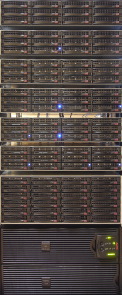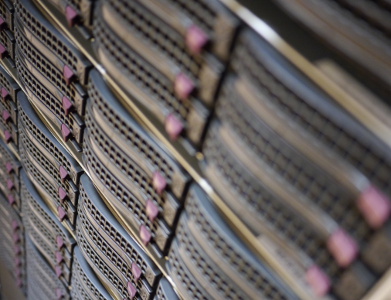Bruker ASCEND spectrometer coupled to a vertical wide-bore (89-mm) magnet operating at 11.74 T (500 MHz for 1H). The console of the spectrometer equipped with three high power radio-frequency (RF) channels of 1000, 1000, and 500 W is configured for solid-state NMR experiments. The spectrometer is provided with the following accessories:
- 5 mm triple resonance (1H/X/Y) magic angle spinning (MAS) probe with different X/Y frequency combinations (realized with various RF inserts) including 13C, 15N, 31P, 11B, 69Ga, or 2H allows to perform high-resolution solid-state NMR experiments in the temperature range from -70 to 80 °C.
- 4 mm double resonance (X/Y) MAS probe covered the frequency range of 15N - 31P allows to perform high-resolution solid-state NMR experiments in the temperature range from -120 to 150 °
- low-temperature wideline probe with four coils (10 mm for 15N, 5 mm and 10 mm for 2H - 139La, and 5 mm for 59Co - 69Ga) allows to perform static NMR experiments down to 7 K.
- gradient system and diffusion probe with two coils of 5 mm diameter dedicated to 1H and 2H allow to perform pulse field gradient (PFG) NMR diffusion experiments using maximal gradient strength in z direction of 3000 G/cm.
- additional equipment like high-pressure lines with nitrogen gas or dry air, heat exchangers, nitrogen evaporator, efficient gas refrigerator, dewars, pumps, etc. allow to obtain a broad range of experimental temperature conditions.
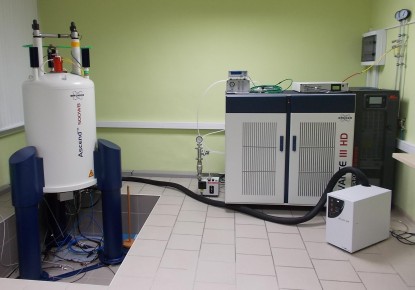
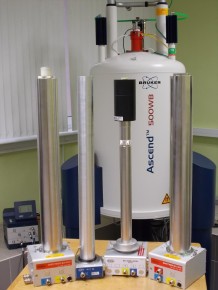
Bruker AVANCE spectrometer coupled to a vertical wide-bore (90-mm) magnet operating at 7.046 T (300 MHz for 1H). Special accessories like a gradient system, microimaging probehead, and the sophisticated imaging package allowed to performed the NMR imaging. The maximal gradient strength in x, y and z direction is 100 G/cm. The probehead for protons has four interchangeable coils of the diameter 5, 10, 15 and 25 mm. For small samples 1H imaging with 2D resolution of about 10 µm are obtained in our laboratory. The Para Vision software supports a variety of special processing functions including statistical analysis in regions of interest and 3D surface reconstruction. The following imaging methods are performed on our spectrometer:
- Gradient Echo Fast Imaging (GEFI)
- Multislice/Multiecho (MSME), T2 calculations
- Snapshot FLASH Method
- Contrast imaging
- Diffusion imaging (SEDIFFUSION, STEDIFFUSION)
- Constant time/ single point imaging (CTI/SPI)
- Localized spectroscopy (VOSY,VSEL)
- Chemical shift imaging (CSIND)

SPINMASTER FFC2000 (the fast Field Cycling NMR relaxometer) is a unique NMR instrument designed to measure the field dependence of NMR spin-lattice and spin-spin relaxation time T1 and T2 (Nuclear Magnetic Relaxation Dispersion profiles) from 10 kHz to 40 MHz (1H Larmor frequency).
The system consist of the following units: 1 Tesla wide-bore electromagnet, double circuit magnet/power supply cooling system; 3 NMR probes working in different frequency range; variable temperature controller system for sample temperature control with 0.1 °C precision in the range of - 120 to + 140 °C; local magnetic field compensation system for low Field Relaxometry and Personal NMR Console with Software package: AcqNMR32.
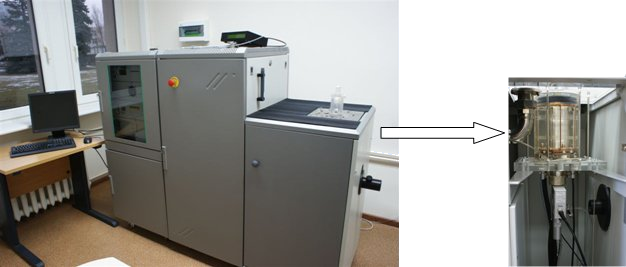
The compact model of SPINMASTER FFC2000 with the electromagnet. The switching time between the polarization, relaxation and detection magnetic field can be 1 ms.

